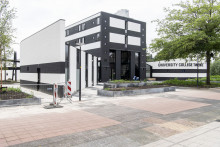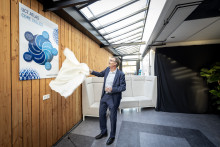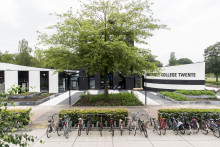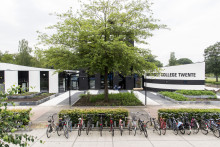Margot Kok, Director of Education Policy at Utrecht University’s Faculty of Science, carried out the evaluation between November and February, at the request of the Executive Board. For this purpose, she interviewed 22 stakeholders: management, lecturers, students, alumni and support staff.
Kok’s reports opens with a striking conclusion: while all stakeholders endorse the value of the University College Twente, they all foresee the end of the programme if no changes are made.
Six issues
Based on the interviews, Kok identified six main issues. The first two concern the positioning of UCT within the UT and the ITC faculty, which has housed the small-scale excellence programme since 2019. The report states that there is no structural communication between the University College Twente and the Executive Board, let alone with all the other faculties. As a result, the responsibility for ATLAS is not widely felt.
Similar problems occur at faculty level. According to the report, the ITC faculty provides the University College with ‘a good home’. However, friction has developed between the Faculty Board and the newly recruited management team of the UCT. This is partly due to the unclear and ambiguous positioning: on the one hand, the Management Team is positioned directly under the Faculty Board and is therefore accountable to the Faculty Board; on the other hand, the University College is expected to operate independently and university-wide.
In addition, the report states that there is a lack of clarity, balance, experience and communication within the Management Team. This affected the HR policy of the University College, where, due to high staff turnaround, ‘junior staff members had to perform important coordinating and leading tasks’, without sufficient guidance.
Unsafe environment
According to the report, the combination of all these problems has resulted in an ‘unsafe environment at all levels’. It states that ‘the scale of the troubles within UCT is currently so high that employees are hindered in their work and life’. And: ‘Some flee into discussions about mandates and agreements, some get sick, some argue, some gossip, some leave, some continue to muddle through. In all cases, interviewees say the students is what makes them go on.’
The report also states that in the meantime, ATLAS students are becoming aware of the unsafe culture. ‘On top of that, they are dissatisfied about the direction UCT is going. They complain about the workload, the clarity in the programme and they indicate that there is too little guidance. They are scared the ATLAS diploma is not valued at the right level by other universities.’
Heleen Miedema
Kok’s main conclusion: it is clear that employees at UCT are not working together and that the views across the different layers of the organisation are not aligned. A common vision has to be developed, investments have to be made in leadership and staff well-being, a new business case has to be made and ATLAS has to become an ‘innovative playground’ for promising lecturers.
In order to solve the ‘systemic challenges’ of the University College, current dean Mieke Boon decided to step back because ‘a different kind of expertise is needed’. This is why Heleen Miedema, former programme director of several health programmes and current Director of Education at the TechMed Centre, will take up the position of interim dean of ATLAS. She will start on 1 May and her term will last for a maximum of two years. Miedema will be given the ‘mandate to carry out the required reorganisation process’.







